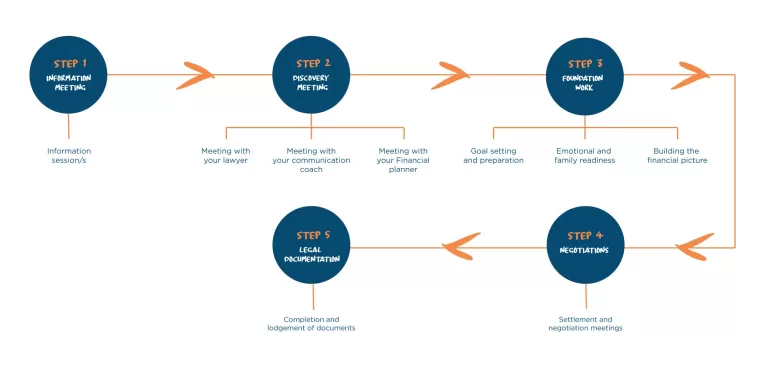How would you describe the emotional pathway of your separation?
“Confusing…..”
“Like going around in circles..…”
“Can’t see the forest for the trees…..”
“Lost in the jungle…..”
To most people’s surprise, these are also reasonably accurate descriptions of typical divorce negotiations.
If you are the average separating Australian, you will go through that process without any roadmap being given to you, by anyone, and we know that’s a problem.
Typically, you will have a lawyer, your spouse will have a lawyer and sometimes there are some other specialists on the scene. The further into this maze you go, the more paper flies around, and the more experts keep popping up, needing to be hired and paid, without clarity about who is doing what and why.
Often, separating people lose sight of their end goal, and to be truthful, so do their lawyers at times. None of this is really surprising, when you consider that discussions about goals don’t often happen, and there are no rules of engagement for lawyer-assisted negotiations between you. Everyone has their own idea of what “negotiation” means, and how to go about it. Assumptions are made that there is a common understanding about process, which frequently proves to be incorrect. In short, there is rarely a roadmap in negotiations, whether that is on the way to court, or to some other form of resolution.
It’s confusing, right?
Stepping back from the chaos, you have to ask yourself “How can such expensive professional support leave a person so uninformed, powerless and confused?”
Is it because:
- you and your ex are receiving different information about the steps being taken?
- nobody gave you a roadmap?
- there is no roadmap for the process?
- everyone is “winging” it?
- the professionals in your case are not clear about their role?
- the professionals lack an understanding of each other’s role?
In too many cases, the answer to too many of the above questions is “yes”
What that means to you in your divorce, is a higher probability of misunderstandings, increased cost and conflict, and a decreased chance of a peaceful and efficient resolution of your issues.
For these reasons, a clear process map or roadmap is so important. Lawyers don’t generally talk about process design, although they do it every day. They don’t generally talk about process maps, but once you engage them, you put them in charge of process. That, as it turns out, is very risky, because even if lawyers design process consciously, for some reason they tend not to share that with clients, or they consider process design to be about internal firm accounting and accountability.
You need the benefits of a Roadmap. A roadmap that is shared:
- reduces anxiety
- brings everyone back on track if and when things go off the rails
- provides a guide and an explanation
- is a tool to measure progress and refocus
- means that you don’t pay your lawyers to design process on the hop, at your expense
Our MELCA process map has evolved over 10 years. Our clients value it, and so do the lawyers, psychologists and financial planners who work with our clients.
Here’s our Map 
Seen any good process maps on a law firm website lately? We’d love to hear from you.


